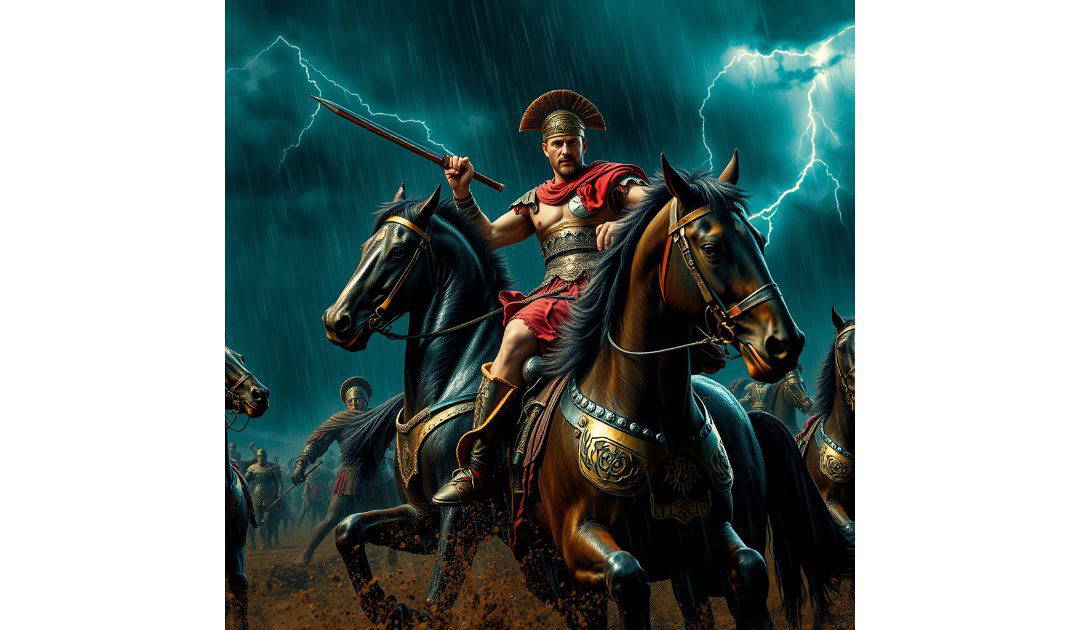On the 11th of June 173 AD, in the middle of a violent thunderstorm, Roman Emperor Marcus Aurelius defeated the Quadi during the Macromanic wars. The reign of Marcus Aurelius, one of Rome’s most celebrated emperors, is often remembered for his philosophical insights and military prowess. Among his many campaigns and victories, the “Miracle of the Rain” stands out as one of the most intriguing and storied events of his career. This miraculous event, occurring in the midst of a critical military campaign, not only solidified Marcus Aurelius’s reputation as a strong leader but also underscored the profound impact of his Stoic beliefs on his governance.
Marcus Aurelius ascended to the Roman throne in 161 CE, at a time when the empire was facing numerous threats on its borders. The Germanic tribes to the north, in particular, posed a significant challenge to Roman authority. In response, Marcus Aurelius embarked on a series of military campaigns, known as the Marcomannic Wars, aimed at quelling these incursions and securing the empire’s frontiers.
The “Miracle of the Rain” occurred during one of the most challenging phases of these wars. In 172 CE, Marcus Aurelius and his forces found themselves surrounded and in a desperate situation. The Roman army, exhausted and suffering from extreme thirst under harsh conditions, was on the brink of defeat. The Quadi, a Germanic tribe, had effectively encircled them, and the situation seemed dire.
It was in this moment of crisis that an extraordinary event unfolded. According to several historical accounts, as Marcus Aurelius prayed for divine intervention, a sudden storm erupted over the battlefield. Torrential rain poured down, revitalising the parched Roman soldiers and providing them with much-needed water. This unexpected weather change not only replenished the Roman forces but also caused confusion and chaos among the Quadi, whose ranks were disrupted by the downpour.
The miracle was seen as a sign of divine favour, and the tide of battle swiftly shifted in favour of the Romans. The refreshed and reinvigorated Roman soldiers launched a counterattack, ultimately securing a decisive victory over the Quadi. This event, which became legendary, was commemorated on the Column of Marcus Aurelius in Rome and in various artistic depictions, celebrating the emperor’s triumph against odds that seemed insurmountable.
The Miracle of the Rain was not simply a military victory; it was a pivotal moment that highlighted Marcus Aurelius’s reliance on his Stoic philosophy. As a practitioner of Stoicism, Marcus Aurelius believed in accepting the events of life — even the most challenging ones — with equanimity and resilience. His faith in the rational order of the universe, as espoused by Stoicism, provided him with the mental fortitude to navigate the numerous difficulties of his reign.
This philosophical outlook was reflected in his personal writings, notably the “Meditations,” where he chronicled his thoughts and reflections amidst the turbulence of his life. In these writings, Marcus Aurelius emphasised the importance of inner strength, virtue, and the acceptance of fate. The Miracle of the Rain served as a testament to his Stoic ideals, illustrating how a calm and rational mindset could enable a leader to persevere through adversity.
Furthermore, the Miracle of the Rain had a lasting impact on the Roman Empire’s perception of Marcus Aurelius as both a military leader and a philosopher-king. His ability to maintain composure under pressure and his apparent divine endorsement bolstered his standing among his troops and citizens. The event reinforced the notion that the emperor was not only a capable military strategist but also a man of profound wisdom and moral integrity.

